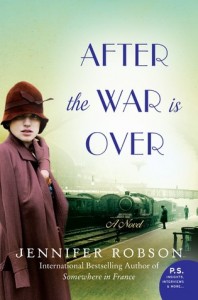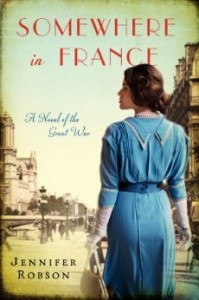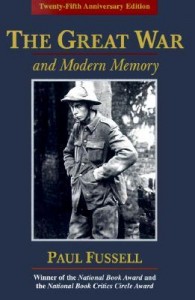 Format read: ebook provided by the publisher via Edelweiss
Format read: ebook provided by the publisher via EdelweissFormats available: paperback, ebook, audiobook
Genre: historical fiction
Length: 384 pages
Publisher: William Morrow Paperbacks
Date Released: January 6, 2015
Purchasing Info: Author’s Website, Publisher’s Website, Goodreads, Amazon, Barnes & Noble, Kobo, Book Depository
The internationally bestselling author of Somewhere in France returns with her sweeping second novel—a tale of class, love, and freedom—in which a young woman must fnd her place in a world forever changed
After four years as a military nurse, Charlotte Brown is ready to leave behind the devastation of the Great War. The daughter of a vicar, she has always been determined to dedicate her life to helping others. Moving to busy Liverpool, she throws herself into her work with those most in need, only tearing herself away for the lively dinners she enjoys with the women at her boardinghouse.
Just as Charlotte begins to settle into her new circumstances, two messages arrive that will change her life. One is from a radical young newspaper editor who offers her a chance to speak out for those who cannot. The other pulls her back to her past, and to a man she has tried, and failed, to forget.
Edward Neville-Ashford, her former employer and the brother of Charlotte’s dearest friend, is now the new Earl of Cumberland—and a shadow of the man he once was. Yet under his battle wounds and haunted eyes Charlotte sees glimpses of the charming boy who long ago claimed her foolish heart. She wants to help him, but dare she risk her future for a man who can never be hers?
As Britain seethes with unrest and postwar euphoria fattens into bitter disappointment, Charlotte must confront long-held insecurities to fnd her true voice . . . and the courage to decide if the life she has created is the one she truly wants.
My Review:
England after the end of World War I was a different place than it had been before the war. An entire generation of young men had died in that war, leaving behind a generation of women for whom there simply would not be nearly enough men to marry for those that wanted to. Which meant that, in spite of the country’s desire to return to the gentler days before the war, there was a generation of women that was going to have to earn a living because there was no choice.
Women had spent the war years working at jobs that men did, for relatively good wages, and did not want to give those jobs and wages up. It was difficult to return to the kind of unskilled and unstimulating labor that they had left behind to become nurses and ambulance drivers at the start of the war. And there were too many families where the husband could no longer work because of war-related injuries, but the wife either couldn’t get a decent paying job, or her husband wouldn’t allow it.
Add to this the changes for those privileged, and those in service. A significant number of young people who would have gone into service for a wealthy and titled family before the war, went into military uniform and experienced a life with considerably more equality. Often it was the equal share in being shelled or gassed, and an equal share in the possibility of dying. But the world changed. Fewer people came back to service after the war, and the life of the privileged classes was forced to change, even if those changes went very much against the grain.
Think of the post-WWI world portrayed by Downton Abbey. The post-war period is markedly different from the pre-war. The universe had changed.
 After the War is Over is the sequel to Robson’s excellent Somewhere in France (reviewed here). The point-of-view character is one of the friends of Lilly and Robbie from that first book. Charlotte Brown is radically different from Lilly and Robbie, bordering occasionally on downright radical.
After the War is Over is the sequel to Robson’s excellent Somewhere in France (reviewed here). The point-of-view character is one of the friends of Lilly and Robbie from that first book. Charlotte Brown is radically different from Lilly and Robbie, bordering occasionally on downright radical.
Charlotte was a nurse during the war, but before and after she served as an aide to a constituency advocate in Liverpool. Charlotte’s job is to find aid and assistance for families suffering from the economic downturn. Even with all the women being fired from what are supposed to be “men’s jobs” there still aren’t enough jobs for all the returning soldiers.
While Charlotte is happy for Lilly and Robbie, and content in the job she is all but married to, something is missing in her life. Someone. Charlotte fell in love with Lilly’s brother Edward the day she met him. Unfortunately, any chance they have for happiness seems doomed. At first, Edward is caught in an engagement arranged by his parents when he was a child. Then, when his father dies and he inherits the earldom, he discovers that his father did a lousy job of managing the estates and that the death duties are ruinous. He breaks off his engagement and searches for a rich young woman whose family fortunes can repair his own.
But the real block to any possibility of happiness is Edward’s continuing depression and illness after the war. He feels as if he will never be a whole man after losing his leg, and he appears to be drinking himself into an early grave. Edward is suffering from shell-shock, but perhaps something more as well.
It will be up to Charlotte and her nursing skills to find out what is really wrong, and to make sure that he takes the care and cure that he needs. Even if she knows she is making it possible for him to be whole with someone other than herself.
She’ll be happy again. Someday.
Escape Rating A-: It’s easy to sympathize with a lot of Charlotte’s story. She is a career woman, long before it was cool. She has an inbuilt drive to do something about for the people who need help. It’s not just that she saw too much as a nurse, it’s the way she’s always been. She recites her own story in a public speech, off the cuff, and it explains so much about what motivates her.
She was also lucky in that her parents supported her goals, whether they completely understood them or not. Her situation contrasts strongly with Lilly’s, as Lilly had to fight to be her own person. Charlotte always was. While there is a difference in class, Charlotte is firmly middle-class, she also faced the expectation that she would marry and have children. Her mother worries that she won’t be happy without those things, but still loves the person she is, and doesn’t try to change her.
It’s good to see a story like this where the heroine has supportive parents and isn’t running away from a horrible, or even just stifling, situation.
A lot of this story is about women’s relationships. Not just about the friendship between Charlotte and Lilly, but particularly about the life Charlotte has created for herself as a single woman. Her friendships (and frenemy-ships) with her co-workers and her housemates are important. As is the late war that hangs over everything in the story.
Charlotte’s relationship with Edward reminded me a bit of Downton, specifically Matthew’s illness after the war and his engagement to the heiress Lavinia Swire. The way that his injuries affected him, the engagement to a woman who may have been the “right woman” to solve his family’s problems but was certainly not the one he loved, and the problems of class were similar to Edward’s predicament, his engagement, and his love for Charlotte. Nothing turns out quite the same, except the happy ending, but the situations are predicated on some of the same decision points.
After the War is Over is much less soap-opera-like over all. The central story is Charlotte’s becoming everything that she can be, and learning to love the life she has, in spite of difficulties thrown into the path of a career woman in the 1920s. Her happy ending is excellent icing on a well-told cake.


